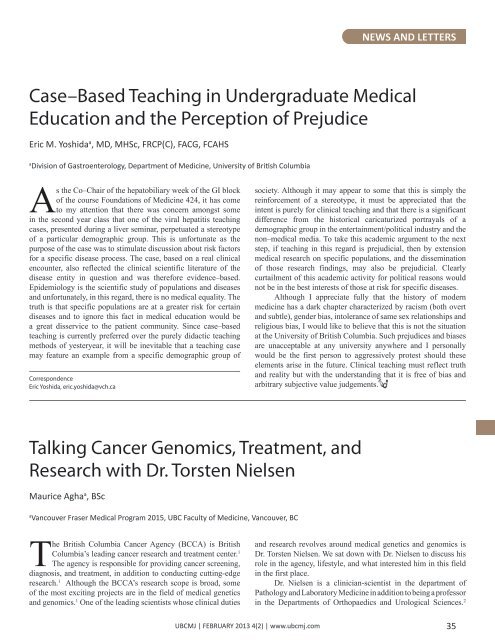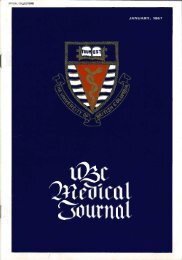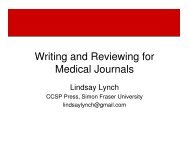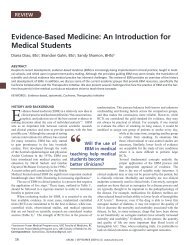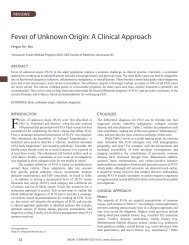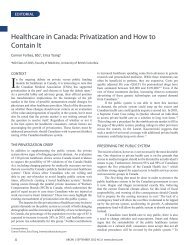Download full PDF - UBC Medical Journal
Download full PDF - UBC Medical Journal
Download full PDF - UBC Medical Journal
You also want an ePaper? Increase the reach of your titles
YUMPU automatically turns print PDFs into web optimized ePapers that Google loves.
NEWS AND LETTERS<br />
Case–Based Teaching in Undergraduate <strong>Medical</strong><br />
Education and the Perception of Prejudice<br />
Eric M. Yoshida a , MD, MHSc, FRCP(C), FACG, FCAHS<br />
a<br />
Division of Gastroenterology, Department of Medicine, University of British Columbia<br />
As the Co–Chair of the hepatobiliary week of the GI block<br />
of the course Foundations of Medicine 424, it has come<br />
to my attention that there was concern amongst some<br />
in the second year class that one of the viral hepatitis teaching<br />
cases, presented during a liver seminar, perpetuated a stereotype<br />
of a particular demographic group. This is unfortunate as the<br />
purpose of the case was to stimulate discussion about risk factors<br />
for a specific disease process. The case, based on a real clinical<br />
encounter, also reflected the clinical scientific literature of the<br />
disease entity in question and was therefore evidence–based.<br />
Epidemiology is the scientific study of populations and diseases<br />
and unfortunately, in this regard, there is no medical equality. The<br />
truth is that specific populations are at a greater risk for certain<br />
diseases and to ignore this fact in medical education would be<br />
a great disservice to the patient community. Since case–based<br />
teaching is currently preferred over the purely didactic teaching<br />
methods of yesteryear, it will be inevitable that a teaching case<br />
may feature an example from a specific demographic group of<br />
Correspondence<br />
Eric Yoshida, eric.yoshida@vch.ca<br />
society. Although it may appear to some that this is simply the<br />
reinforcement of a stereotype, it must be appreciated that the<br />
intent is purely for clinical teaching and that there is a significant<br />
difference from the historical caricaturized portrayals of a<br />
demographic group in the entertainment/political industry and the<br />
non–medical media. To take this academic argument to the next<br />
step, if teaching in this regard is prejudicial, then by extension<br />
medical research on specific populations, and the dissemination<br />
of those research findings, may also be prejudicial. Clearly<br />
curtailment of this academic activity for political reasons would<br />
not be in the best interests of those at risk for specific diseases.<br />
Although I appreciate <strong>full</strong>y that the history of modern<br />
medicine has a dark chapter characterized by racism (both overt<br />
and subtle), gender bias, intolerance of same sex relationships and<br />
religious bias, I would like to believe that this is not the situation<br />
at the University of British Columbia. Such prejudices and biases<br />
are unacceptable at any university anywhere and I personally<br />
would be the first person to aggressively protest should these<br />
elements arise in the future. Clinical teaching must reflect truth<br />
and reality but with the understanding that it is free of bias and<br />
arbitrary subjective value judgements.<br />
Talking Cancer Genomics, Treatment, and<br />
Research with Dr. Torsten Nielsen<br />
Maurice Agha a , BSc<br />
a<br />
Vancouver Fraser <strong>Medical</strong> Program 2015, <strong>UBC</strong> Faculty of Medicine, Vancouver, BC<br />
The British Columbia Cancer Agency (BCCA) is British<br />
Columbia’s leading cancer research and treatment center. 1<br />
The agency is responsible for providing cancer screening,<br />
diagnosis, and treatment, in addition to conducting cutting-edge<br />
research. 1 Although the BCCA’s research scope is broad, some<br />
of the most exciting projects are in the field of medical genetics<br />
and genomics. 1 One of the leading scientists whose clinical duties<br />
and research revolves around medical genetics and genomics is<br />
Dr. Torsten Nielsen. We sat down with Dr. Nielsen to discuss his<br />
role in the agency, lifestyle, and what interested him in this field<br />
in the first place.<br />
Dr. Nielsen is a clinician-scientist in the department of<br />
Pathology and Laboratory Medicine in addition to being a professor<br />
in the Departments of Orthopaedics and Urological Sciences. 2<br />
<strong>UBC</strong>MJ | FEBRUARY 2013 4(2) | www.ubcmj.com 35


